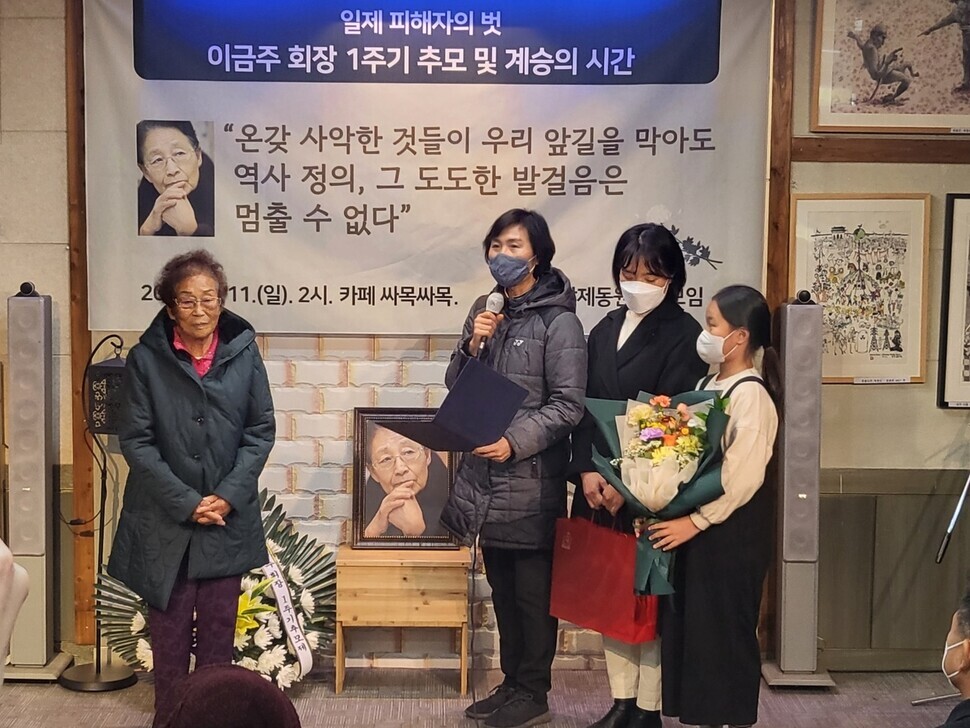hankyoreh
Links to other country sites 다른 나라 사이트 링크
[Reporter’s notebook] Foreign Ministry’s focus on Japan leaves forced labor victims out in the cold

“Does the Ministry of Foreign Affairs even regard the compulsory mobilization that took place during the Japanese occupation as a human rights violation?”
Reporters posed that question in a background briefing held at South Korea’s Foreign Ministry on Thursday.
The press conference took place shortly after the conferral of the Moran Medal, the second rank of the Order of Civil Merit, for Yang Geum-deok was postponed at the Foreign Ministry’s request.
As a victim of forced labor with the Korean Women's Volunteer Labour Corps during Japan’s occupation of Korea, Yang has spent the last 30 years shuttling between Korea and Japan in her ongoing campaign for justice in the courts.
Reporters unleashed a flood of questions about the deferral of Yang’s award during the background briefing. “Does the Awards and Decorations Act require preliminary deliberations?” “What does the Foreign Ministry have to do with conferring human rights awards?”
But an official from the Foreign Ministry repeatedly deflected the questions. “This was supposed to be arranged in advance through deliberations at the vice ministerial level,” the official said. “We’ve only raised a procedural issue.”
That attitude has raised questions about the Foreign Ministry’s true intentions regarding the forced labor issue.
Thus far, the ministry hasn’t offered a definite response to questions about that issue. It has declined to provide details about what it regards as a diplomatic matter connected with Japan.
The problem is that the victims of forced labor under the Japanese occupation themselves aren’t receiving updates from the Korean government. Victims say that communication with the government has basically been suspended since Yoon Suk-yeol became president.
In fact, the victims have resorted to asking reporters how talks on the forced labor issue are going.
The Foreign Ministry’s quarterly meetings with the victims have turned into a soapbox for the ministry to elaborate on its unilateral decisions.
That was the case in a meeting in Gwangju on Dec. 8 with a group supporting the victims when the group asked why the ministry was blocking the conferral of Yang’s award.
“We’re not opposed to the conferral of the award, but procedurally speaking there needed to be preliminary deliberations with the relevant organizations, and we expressed our viewpoint after being belatedly briefed on the issue,” the ministry said.
With the Korean government focused on Japan, the victims of forced labor find themselves alone once again.
Since the Foreign Ministry has deferred Yang’s award, groups supporting the victims have decided to provide her an honor of their own.
The Citizens Association on Imperial Japan’s Forced Labor Mobilization gave Yang a citizen-sponsored honor called “our human rights award” in a cafe in Gwangju on Sunday.
Monday marks one year since the death of Lee Geum-ju, former head of the Gwangju Association of Pacific War Victims’ Families, who received South Korea’s Human Rights Award in 2019 without the Foreign Ministry raising any objections.
By Shin Hyeong-cheol, staff reporter
Please direct questions or comments to [english@hani.co.kr]

Editorial・opinion
![[Column] Welcome to the president’s pity party [Column] Welcome to the president’s pity party](https://flexible.img.hani.co.kr/flexible/normal/500/300/imgdb/original/2024/0515/3917157400447943.jpg) [Column] Welcome to the president’s pity party
[Column] Welcome to the president’s pity party![[Editorial] Korea must respond firmly to Japan’s attempt to usurp Line [Editorial] Korea must respond firmly to Japan’s attempt to usurp Line](https://flexible.img.hani.co.kr/flexible/normal/500/300/imgdb/original/2024/0514/2317156736305813.jpg) [Editorial] Korea must respond firmly to Japan’s attempt to usurp Line
[Editorial] Korea must respond firmly to Japan’s attempt to usurp Line- [Editorial] Transfers of prosecutors investigating Korea’s first lady send chilling message
- [Column] Will Seoul’s ties with Moscow really recover on their own?
- [Column] Samsung’s ‘lost decade’ and Lee Jae-yong’s mismatched chopsticks
- [Correspondent’s column] The real reason the US is worried about Chinese ‘overcapacity’
- [Editorial] Yoon’s gesture at communication only highlights his reluctance to change
- [Editorial] Perilous stakes of Trump’s rhetoric around US troop pullout from Korea
- [Guest essay] Preventing Korean Peninsula from becoming front line of new cold war
- [Column] The state is back — but is it in business?
Most viewed articles
- 1[Column] Welcome to the president’s pity party
- 2Could Korea’s Naver lose control of Line to Japan?
- 3Korean opposition decries Line affair as price of Yoon’s ‘degrading’ diplomacy toward Japan
- 4[Editorial] Korea must respond firmly to Japan’s attempt to usurp Line
- 5[Correspondent’s column] The real reason the US is worried about Chinese ‘overcapacity’
- 6[Column] Will Seoul’s ties with Moscow really recover on their own?
- 7US has always pulled troops from Korea unilaterally — is Yoon prepared for it to happen again?
- 8Naver’s union calls for action from government over possible Japanese buyout of Line
- 9[Editorial] Transfers of prosecutors investigating Korea’s first lady send chilling message
- 10Major personnel shuffle reassigns prosecutors leading investigations into Korea’s first lady